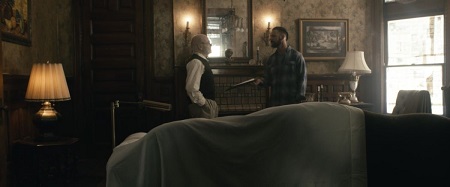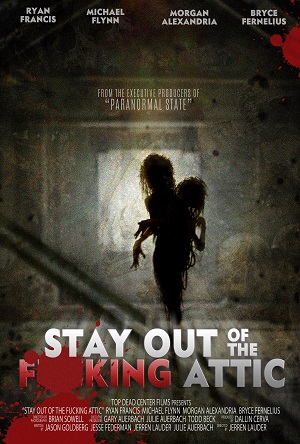
Creaky Attic Built on a Weak Foundation
There is something strange about Vern Muller (Michael Flynn). Schillinger (Ryan Francis) is an ex-con who now owns his own moving company. He and his two employees, Imani (Morgan Alexandria) and Carlos (Bryce Fernelius), have been hired by the old man to pack up his giant house in a single day. Muller understands the task will be difficult to complete, but he’s willing to pay many times beyond the going rate to ensure his needs are met.
As they are all in need of the cash, the trio are initially willing to overlook strange things they are packing up and all the eerie noises echoing through the house. But it is soon apparent Muller is not the kindly old German gentleman he proclaims to be. There is something sinister going on, especially up in the attic, one of the few places in the home Schillinger and his crew were explicitly instructed not to venture.
The setup to Stay Out of the Attic is undeniably effective. Muller’s house is suitably creepy, and it’s easy to root for all three former convicts who are all trying to change their lives for the better by doing hard work for decent pay. As strange as things are, it’s understandable why the trio would stick around as long as they do, willing to look past all the unnerving nuttiness to facilitate better lives for both themselves and their respective loved ones.
But for all the good ideas that director Jerren Lauder and his team of screenwriters come up with, there are just as many that do not work out so well. A surprise involving Muller’s identity is oddly silly, while a reveal concerning Schillinger and the truth behind his prison tattoos is rather underwhelming.
I don’t think centering things on Schillinger and not on his two compatriots was the way to go. The film becomes a redemption arc for a reformed racist that relegates the two Black characters to the background, their dual heroics during this unthinkably hellish situation nowhere near as triumphantly celebrated as Schillinger’s are. While I do appreciate the message of transformation, change and forgiveness Lauder is going for, centering things in this manner unintentionally reeks of white privilege.
It reminded me of the Academy Award-winning Green Book. While that is a much better overall film, the comparison isn’t as peculiar as is it sounds. Much like that one, I watched Stay Out of the Attic wondering if I’d have liked it more had Lauder told his tale from a different character’s perspective. Schillinger’s story could have remained largely the same, but the insight and nuance that potentially could have been garnered had either Imani or Carlos been the focal point is to my mind obvious.
Look, I can only judge Lauder’s movie for what it is and not for what I wished or wanted it to be. But even on that front I still think this horror yarn comes up short. Some of the shocks are solid, and a reveal involving a poor young woman introduced roughly halfway through it admittedly effective. There’s a bit of eye trauma that had me noticeably squirming in my seat and would have made Lucio Fulci stand up and applaud, while a post-credits coda did produce a satisfied chuckle.
But so what? Schillinger isn’t built up enough for his transformation to satisfyingly resonate. As for the reveal as to Muller’s true identity, as I’ve already mentioned this falls stunningly flat considering who he is supposed to be and the horrendous reality of the experiments he’s been secretly conducting over the decades. A monstrous creation unleashed upon the movers ends up doing practically nothing of importance and is dispensed with far too easily. Worst of all, there’s precious little tension generated by anything that transpires, and considering what all this abhorrent madness is about that’s pretty dang disappointing and then some.
I just didn’t care for Stay Out of the Attic. The actors do give it their best shot, and the gore is unquestionably impressive. But the creaky story leaves too much to be desired, this depraved psychotic freak-out built upon a weak foundation that’s constantly on the verge of collapse.
Film Rating: 1½ (out of 4)








